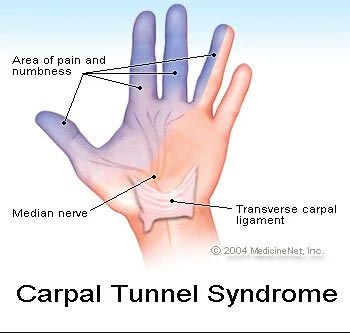What is carpal tunnel? The carpal tunnel is a “tunnel” or area in your wrist where nerves run through, and these nerves running through may become irritated leading to symptoms of carpal tunnel syndrome including pain, tingling, numbness, and weakness in the hands, wrists, and fingers.
How Does Carpal Tunnel Syndrome Occur?
Many things can cause carpal tunnel, in fact, one out of ten people suffers from this syndrome.
Carpal tunnel usually effects people who do repetitive tasks using their hands. This includes computer use, secretaries, sushi chefs, meat cutters, assembly line workers, carpenters, musicians, servers, artists, doctors, athletes, and other similar tasks.
Sometimes the cause of your carpal tunnel syndrome is not known. Essentially, within the wrist is the median nerve, and if this nerve becomes irritated and/or inflamed due to pressure, than symptoms of carpal tunnel may occur.

How Is Carpal Tunnel Syndrome Associated With The Spine?
There is a relationship between the health of your spine and carpal tunnel syndrome. Researchers have found and documented irritation in the spinal nerve roots in patients with carpal tunnel. Additionally if you have compression or interruption in communication within the nerves of the spine, especially in your neck, than the signals from these nerves in your neck may be blocked, and the flow of nutrients to the wrist may be compromised.
When studied, it was found that a large percentage of people with carpal tunnel syndrome also have arthritis or degenerative disc disease in their necks.
Chiropractic care is the treatment of choice for degeneration in the neck and thus for carpal tunnel syndrome. If you are experiencing symptoms associated with carpal tunnel, you should see a chiropractor to determine if you have spinal subluxations and/or degeneration in your spine. Chiropractic care including the chiropractic adjustment may reduce or eliminate your symptoms of carpal tunnel and eliminate the need for you to have surgery.
Traditional medical treatment for carpal tunnel will include splints, ice, drugs, cortisone injections, and surgery. Unfortunately, medicine has a poor success rate in treating carpal tunnel. Specialists in muscle & joints, including chiropractors, can and will offer you better results. (Davis PT et al., JMPT 1998;21(5):317-326.)
You can have a pain-free wrist and continue to work and enjoy your activities. Seek out alternative methods for managing your wrist pain today.
If you enjoyed this article and found it helpful, share below on Facebook. Thank you!
